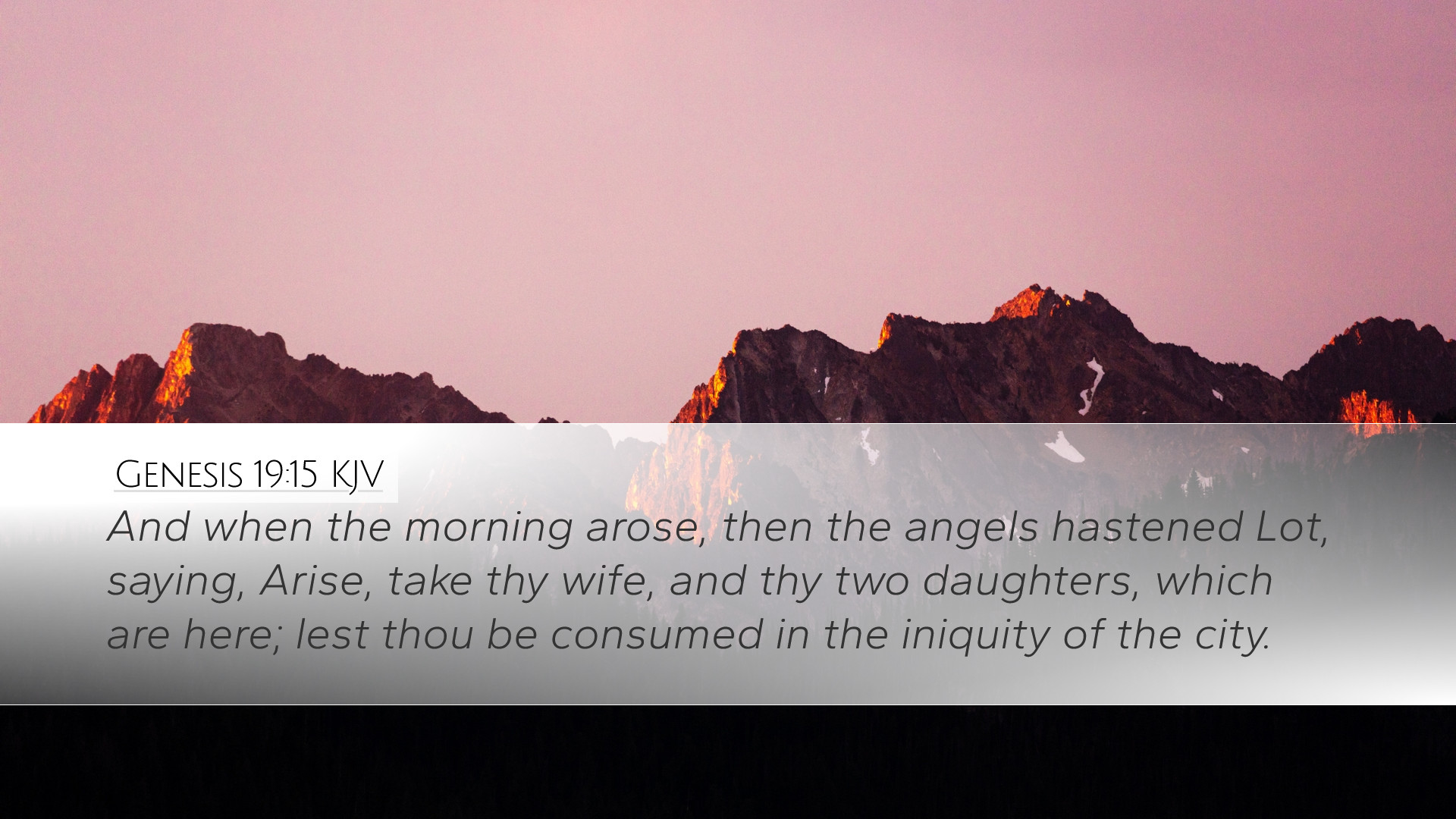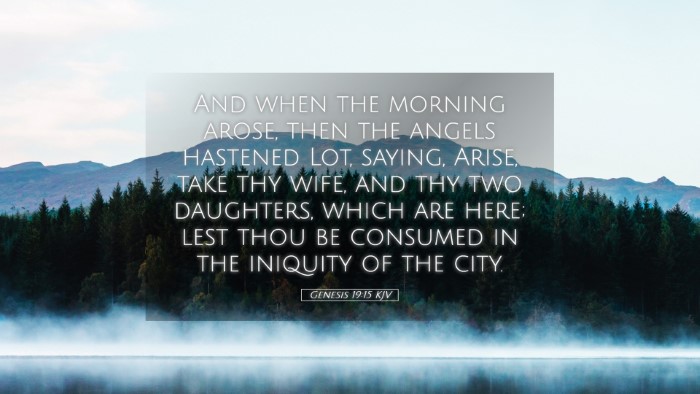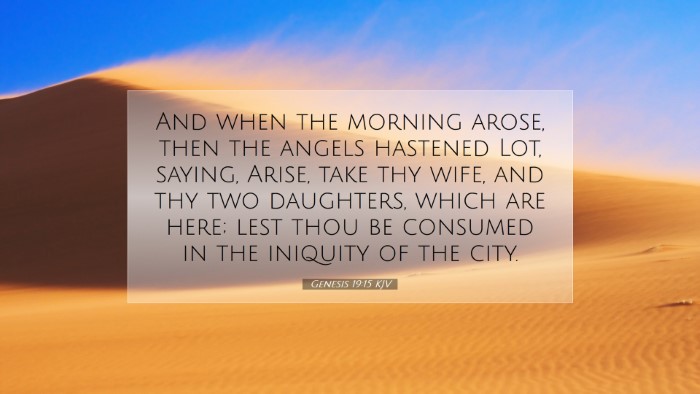Commentary on Genesis 19:15
Text of Genesis 19:15 (ESV): "As morning dawned, the angels urged Lot, saying, 'Up! Take your wife and your two daughters who are here, lest you be swept away in the punishment of the city.'"
Overview
This verse is pivotal in the narrative of Sodom's destruction, highlighting both the urgency of divine judgment and the grace extended to Lot and his family. The angels' insistence on immediate action underscores the impending doom faced by the cities of the plain due to their grievous sins.
Commentary Insights
1. The Urgency of the Divine Command
Matthew Henry: Henry emphasizes the urgency and necessity of the angels' command to flee. The dawn represents both a literal and metaphorical awakening to the imminent danger that bears down upon Sodom. The use of "urged" indicates a command that comes with authority and necessity, as hesitation could mean destruction. This reflects the seriousness of responding to God's warnings.
Albert Barnes: Barnes notes that the morning light signifies both hope and judgment. The angels’ call is an invitation for Lot to escape the moral and spiritual darkness of Sodom. The contrast between light and darkness in this passage underscores the need for righteousness amid sin. Lot's prompt action is critical, as the delay could lead to dire consequences.
2. The Characters Involved
Adam Clarke: Clarke points out that Lot serves as a representation of the remnant—a righteous individual amid widespread corruption. The angels' choice to save Lot reveals God's mercy, contrasting sharply with the fate awaiting the impenitent cities. Lot's family is also highlighted, showing the principle that familial ties can influence divine mercy, yet they also bring a solemn responsibility.
3. The Desperation of Salvation
Matthew Henry: Henry remarks on Lot's circumstances, emphasizing how he was forewarned yet still hesitated at the brink of disaster. This illustrates the human tendency to cling to familiar comforts, even when faced with catastrophic consequences. The plea to Lot demonstrates God's persistent call for individuals to heed His direction in times of crisis.
Albert Barnes: Barnes discusses the implications of the command to take “your wife and your two daughters.” This highlights God’s desire for the preservation of families—even those in a corrupted environment. The mention of Lot's family is significant; it reminds us of the importance of unity in God’s redemptive plans. It serves as a challenge for believers today to guide their families toward righteousness amidst societal decay.
4. The Consequence of Disobedience
Adam Clarke: Clarke emphasizes that the stakes of disobedience are incredibly high; not only for Lot but for all involved in his family. The reminder to flee “lest you be swept away” reinforces the seriousness of divine judgment. It reflects the nature of God’s justice, which is both swift and certain when it comes to dealing with unrepentant sin.
5. Spiritual Lessons Learned
Matthew Henry: Henry provides insight into the spiritual implications of Lot's actions. He observes that the text invites readers to reflect on their own lives and the influences of sin that may seduce them. The need to heed divine warning is ever-present, and believers must be vigilant against complacency. Lot's rescue highlights the importance of faith and obedience, key components in a believer's life.
Albert Barnes: Barnes concludes with a sobering reminder that just as Lot faced immediate danger, modern believers are continually faced with choices where obedience to God leads to life, whereas disobedience leads to destruction. This passage encourages pastors and scholars alike to reflect on their ministry's urgency in calling others to salvation.
6. Practical Application
Adam Clarke: Clarke urges ministers and theologians to take note of the dynamics present in Lot’s rescue narrative. They are encouraged to emphasize the need for repentance and action. The witness of Lot's life provides a clear admonition: to guide the congregations entrusted to them away from spiritual complacency and towards vigilant faithfulness.
Matthew Henry and Albert Barnes: Both commentators would agree that the urgency in Lot’s story serves as a continual reminder for Christians to be aware of the times and the call to holiness. This passage invites believers to consider their response to God’s call and to encourage others in their communities to flee from sin and embrace the grace offered through Christ.
Concluding Thoughts
Genesis 19:15 encapsulates profound truths surrounding judgment, grace, and the urgency of divine calling. It challenges believers to carefully assess their lives and the lives of those around them in light of God’s imminent return. The insights from reputable commentators such as Henry, Barnes, and Clarke provide a rich tapestry of theological reflection, urging not only an understanding of the text but action in accordance with God's will.


